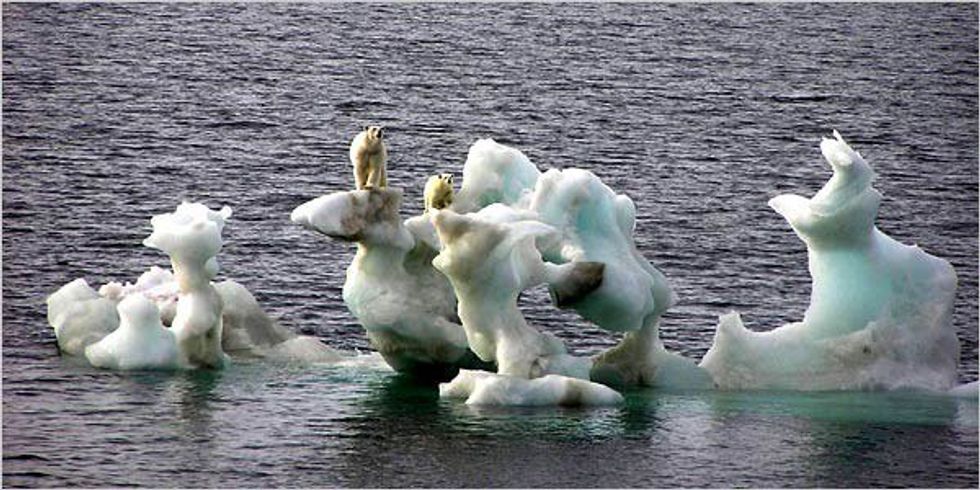Climate change has been pressing upon the public conscious since Al Gore popularized it in his documentary "The Inconvenient Truth"—and perhaps even before this, too. Yet despite the images of polar bears drowning, smog-covered cities and eroding coastlines that cloud our Twitter feeds and news headlines, many of us aren't really doing much about it. It's another concern, amongst the innumerable others in our busy lives, that seems too big for us to do anything about and too vague for us to prioritize.
Indeed, changing our collective behavior to reduce our culture of waste—and subsequently, our carbon footprints—would require enduring quite a bit of inconvenience. However, superseding the physical inconvenience of behavioral change is the cognitive inconvenience of overcoming the psychological impediments embedded in human consciousness that are inhibiting us from believing action is even necessary.
Here are six insights as to why we are choosing not to care and thus, constraining ourselves from changing our behavior:
1. Uncertainty & Complexity
A large proportion of us still don’t quite understand the complex causal chain that links excessively driving our cars to increased global temperatures and sea level rise. Thus, we turn to experts to summarize the information for us and answer our how and why questions. Indeed, a study conducted by Yale University found that only 41 percent of Americans agree that there is scientific consensus surrounding the reality of climate change. As a result, the other 59 percent of us default to waiting until consensus has been declared to decide whether or not we should worry. The reality? There already is widespread consensus. Several studies, including the IPCC report, have found that 97 percent of scientists from various disciplines agree not only that climate change is real, but also that humans are the primary cause. Skepticism breeds inaction, but it is necessary to note that skepticism has been rendered unfounded. However, it is difficult for the public to see this due to the very vocal minority of disbelievers and a comparatively quiet majority of believers.
2. Hyperbolic Time Discounting
This sounds like a really complicated theory (and it kind of is), but for the purposes of this quick article, it is simply the idea that when humans make decisions, we tend to underweight future risks. This can also be thought of as present bias. It makes sense. It’s why you are more worried about your 5-page paper that’s due tomorrow than you are about your 20-page term paper that’s due in two weeks. It’s also the reason why you might choose to accept $5 today rather than $10 a year from today. Climate change is a difficult risk for us to prioritize because its implications will be felt most significantly in the future. Thus, when we weigh the value of changing our behavior to ensure that we avoid the future risks climate changes presents to us, it becomes insignificant in comparison to actions to mitigate the risks that are temporally closer to us. We choose to drive to work instead of walk because we are more concerned about being late than we are about the prospect that our grandchildren will have to deal with significant air pollution.
3. Cognitive Myopia
This is a really fancy way of saying that we care less about things that are far away from us, both temporally and spatially. It is not only the reason why it’s difficult for us to weigh the importance of acting now to prevent future risks, but also the reason why we don’t spend a lot of time worrying about people enduring the California drought when we are being drenched with rain in New Jersey. It’s hard for us to concern ourselves with consequences that are happening far away from us and consider that those consequences could someday scale to impact us as well. Indeed, the impacts of climate change today are falling most visibly on regions that are spatially distant from us in the United States. Countries like Bangladesh are experiencing devastating monsoons, Africa is experiencing droughts—but in reality, the impacts of climate change are everywhere. We just don’t always see them, and the most dramatic stories we do hear seem irrelevant to us because they are so spatially distant.
4. Limited Capacity for Worry
We are human. Cognitively, there are only so many things that we can worry about and prioritize at once. Behavioral scientist Eldar Shafir called this our “bandwidth” in a guest lecture in one of my classes this week. He was talking about how people who are living in scarcity make decisions. In a way, we all live under some constraint of scarcity. Whether it stems from our limed time, lack of resources or mental capacity to worry about certain issues, it means that we only have the capacity to worry about a finite diversity of things at once and, due to cognitive myopia and hyperbolic time discounting, climate change frequently takes a backseat to other more spatially or temporally pressing concerns.
5. Choice Architecture
Changing our habits is hard. It’s even more difficult when our choice architecture perpetuates our habits. A choice architecture is the environment in which a person makes decisions. For example, if you are a busy person living in a city who is going to the office all day and your office doesn’t have a water filter, it’s much easier to buy a ton of plastic water bottles than it is to figure out how to fill up your reusable bottle. The best way to change these habits is to make the more sustainable choices easier for people. For instance, install a water filter and remove the vending machine that sells plastic bottles—a simple example of how we can help ourselves change our habits in a sustainable manner to benefit the environment. The basic idea is that you make the changes in behavior easier by making the choice to change more convenient and accessible.
6. The Collective Action Problem & Tragedy of the Commons
Tragedy of the commons is a theory proposed by Hardin that has pervaded contemporary conversations regarding public pool resource. The environment and our global climate is a fundamental example of a public pool resource. The logic is that public goods (such as clean air and water) require collective action to be protected. If I choose to limit my pollution individually, I will still suffer the consequences of my neighbor who has not made the same choice, while he will reap the benefits of my sacrifice. Thus, it is in my best interest to continue polluting, too. The same issue applies when it comes to reducing our carbon footprints. We do not think that we can make a notable difference for the environment unless a significant amount of our friends decide to change their behaviors as well. Due to lack of coordination and complete commitment, none of us act, because none of us want to be the only ones to make the sacrifice.
So, what can we do?
We can start paying more attention and cultivating empathy for future generations who will inherit these problems. We can combat our myopic tendencies by reminding ourselves that we are responsible for the future of others. We can start supporting policies that change our choice architecture and make sustainable choices easier to make—like accessible single-stream recycling or subsidized prices for hybrid cars or solar energy. Perhaps, most importantly, we can start using social norms to increase the immediate pressure people feel to change their behaviors. Maybe you don’t recycle because you believe it will benefit the planet, but rather because you know your neighbors will look down upon you if you don’t. We must become aware of why we aren’t acting so that we can begin to overcome our apathetic tendencies and pursue a solution-oriented course of action.





















